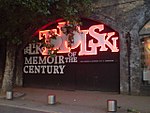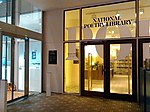Telecinema

The Telecinema was a small cinema built especially for the Festival of Britain's London South Bank Exhibition in the summer of 1951. It was situated between Waterloo station and the Royal Festival Hall. The Telecinema was one of the most popular attractions of the Festival, with 458,693 visitors. Many people had to be turned away. When the Festival of Britain ended, the press and public called for its retention, and, following discussion with the London County Council and the film industry, "the building was formally handed over to the BFI for use as a members-only repertory cinema club. It was re-equipped with 400 seats, projection facilities for both 16mm and 35mm, and re-opened in October 1952 as the National Film Theatre. It remained until 1957 when the NFT relocated to a cinema under Waterloo Bridge.
Excerpt from the Wikipedia article Telecinema (License: CC BY-SA 3.0, Authors, Images).Telecinema
Belvedere Road, London Lambeth (London Borough of Lambeth)
Geographical coordinates (GPS) Address Nearby Places Show on map
Geographical coordinates (GPS)
| Latitude | Longitude |
|---|---|
| N 51.505277777778 ° | E -0.11527777777778 ° |
Address
Whitehouse Apartments
Belvedere Road 9
SE1 8YP London, Lambeth (London Borough of Lambeth)
England, United Kingdom
Open on Google Maps










